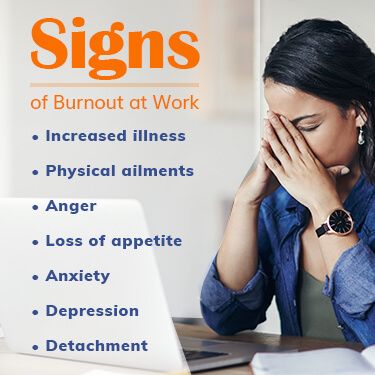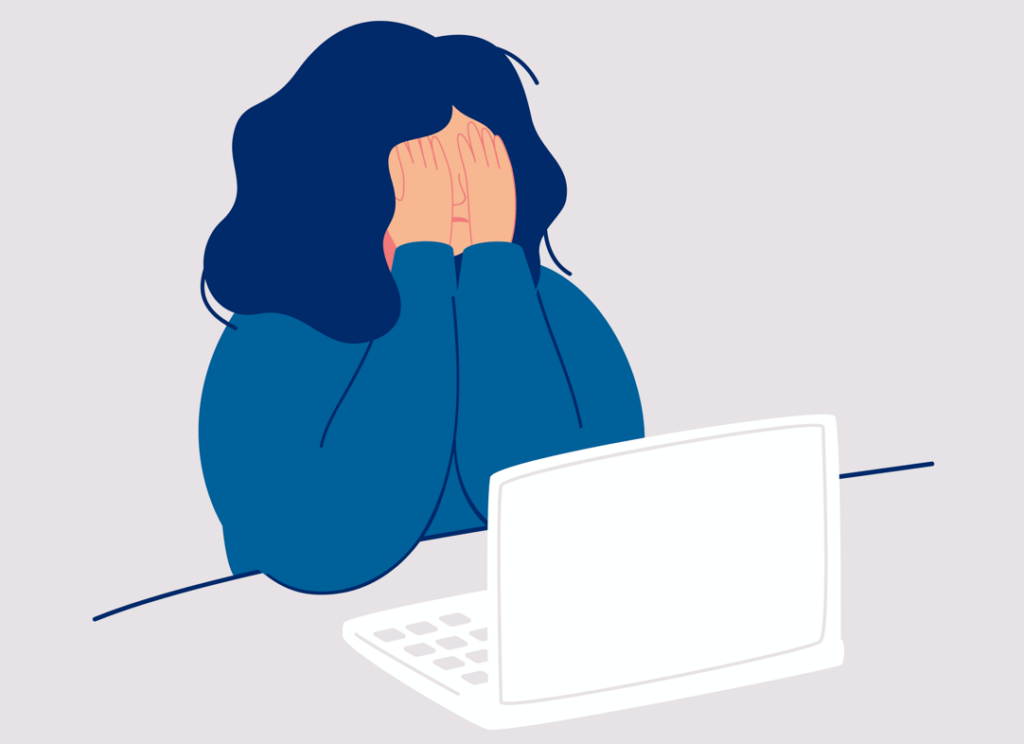Workplace anxiety is something that we all experience at one point in our lives. It can be stressful to think about a big presentation, an interview, or being unemployed. But if the stress becomes so intense and frequent that it interferes with your ability to function, you should talk to someone and get help. This blog post will tell about different types of work-related anxieties and how it affects you. There will be some strategies to help you overcome these fears and take control of your career again.
Contents
What is Work Anxiety?

When you are at work, you might feel stress or anxiety. You might feel overwhelmed and worried about your job and how it affects your relationships with people. Many employees find themselves in a tough situation at work. They have to be brave, calm and focused on their jobs even when there is a lot of pressure from work. This article will tell you how to fix your problems with work. You can know what causes them, and the symptoms to look out for, and then you can fix it.
Signs of Work Anxiety
When you’re feeling anxious, it can be difficult to tell the difference between nervousness and workplace anxiety. This is because both feelings produce similar symptoms such as:

- A racing heart rate;
- Sudden profuse sweating;
- Weak legs;
- Clammy hands;
- Loss of appetite or weight loss (in extreme cases);
- Difficulty sleeping;
- Constipation;
- Diarrhea.
Causes of Work Anxiety
There are a number of causes for workplace anxiety. Some of these include the following:
- Fear of losing your job can lead to increased stress and pressure at work.
- A boss that is too hard on their employees and criticizes them all the time. This might make you feel bad when things go wrong at work and it can also make you anxious.
- A work environment where people are very competitive or demanding. They always seem to have more success than you do, no matter how hard you try. That is very stressful because you want to be better than everyone else around you.
- Anxiety during interviews is common. This often happens when you are new to this situation or if you are afraid of the unknown.
- Stuck in a frustrating circumstance that you believe you can’t get out of – this is something that drives many individuals to anxiety at work since they are unsure how to end it without angering their boss or coworkers.
- Criticism or abuse by your boss, coworkers, or clients might cause worry about the job you do, especially if it is frequent and/or severe. It’s possible to lose interest because of this bad feedback at work.
Effects of Workplace Anxiety
- Workers who don’t have very much self-confidence and who are not happy with themselves.
- Working too much can make people shy, nervous, or introverted. People may not talk to others on their break. This causes a problem for managers who want their staff to get along well outside of work. The working culture will be different and the team effort will be less effective.
- Some people have a hard time focusing on their work when they are feeling stressed or anxious. This can cause them to do poorly in their job and they might even get fired.
- Anxiety disorders are common. You might have one. This number is higher if you feel stress at work or because of a change at work.
Telling your Employer About Workplace Anxiety

If you feel a lot of anxiety at work, you might not know whether to tell your boss. You might also have an anxiety disorder and not know if you need to share this information with your employer.
Know that if you have a disorder, you have certain rights. If it is hard for you to work at your job, maybe ask for some help. You can do this because of the Americans with Disabilities Act.
It is not wrong to tell your employer how you feel. They will probably be nice and offer help. They might give you a referral to a mental health professional or give you access to something like a stress management class.
You don’t know for sure until you ask. Below are some tips for employers about how to help their employees with workplace anxiety:
- Treat all employees as your equals. Talk to them and tell them the truth.
- Talk to employees in private. They might want to keep their personal life secret.
- Talk about general things, not work.
- You should give your employees time to answer and try to understand what they are saying.
How to deal with Workplace Anxiety?

Work anxiety is a problem that affects everyone and it appears in different ways. It can be simple nervousness to the point of feeling like you want to run away from work or go back home if possible.
Know Everyone’s Name
The first thing you must do is remember the names of the people who work for you. Imagine you are at a party and someone asks your name. You might feel embarrassed if you don’t know their name.
Ask For Help
You should also ask for help when you need it instead of trying to do everything by yourself. This will show your colleagues that they can count on you if needed.
Avoid Triangles
Don’t form triangles and avoid them. If you don’t communicate well with your colleagues, they will make mistakes that could have been avoided if they communicated better.
Take care. You might be tempted to talk about your problem with a coworker, but that’s not a good idea. It can give them bad feelings about you. If you want to fix the problem, talk to the person who is causing it and tell them how you feel about it in a polite way. You want to tell them that you are willing to work out a plan that will make everyone happy. If you are the boss, then try to figure out what they want and listen to them.
Set Honest Deadlines
You need to be honest with yourself and set a deadline. How long will you try to work on the problem before giving up? It’s better to stop trying than to keep at it and waste time.
Find out What Makes You Nervous
When you know what is making you anxious, try to avoid it. If that is not possible, find something else to do when the thing is happening. For example, if you are afraid of talking in front of people, then just write the speech and read it.
Believe in Yourself
Don’t believe that you are not good enough to do something. You are very capable if you put your mind to it. If there is a task at work that seems too hard for you, find someone who knows how to do it and then find out how they do it.
Solve One Problem at a Time
It’s best to try not to worry about more than one thing at once because you can’t focus on everything all the time. It’s better if you take care of one problem and then go to another when you are ready for it. If you do this, you will be happier and more productive at work.
Stay Calm
Don’t let your anxiety get the best of you because that is not good for anyone. You should try to stay calm even if things around you are not going as planned or expected. This can help prevent mistakes that could end up hurting someone else’s feelings.
Work on Your Breathing
Your breathing could be too fast or too deep, so take some time to think about it. Try doing something else for a few minutes before you go back to work again. This will be because if your breathing is shallow, then your body cannot get enough oxygen and that can make the anxiety calm down help you function better at work.
Take Breaks
When you take a break, you can come back to the task with more energy. It is good to exercise every day. It keeps your body in a functioning state for a long time. Also. it allows you to be more alert, wherever it is required.
Use Neutral Language
Do not use negative words when talking to yourself. Instead of saying “I can’t do this,” say “This is hard for me right now.” This will help you get through the situation better. Find someone who will be your friend. They know you and what you might say. For example, if they were talking to you, they would tell you that it is okay not to know all the answers or do something right away. Anxiety will never go away completely. Everyone gets it from time to time. But you can take steps to manage your anxiety and live a healthier lifestyle.
Stay in Contact
Make a list of people to call when things are bad. They will think about your problem and not theirs. This might help you feel better because they will tell you something that makes you laugh or tell you how to solve the problem at work.
Limit Negative Thoughts
When you have a thought that might make you feel bad, write it down. Think about if it is true or not. If there are no facts to support your statement, then discard the thought because there is nothing for you to worry about. The anxiety will go away as soon as possible.
Boost Your Self-Esteem
It is okay to say that you don’t know something or can’t do something. You are human and everyone makes mistakes. This will help your self-esteem because it shows that you want to be honest with yourself and others around you. People appreciate this type of honesty more than trying to pretend like everything is perfect even when it’s not.
Be Positive
When you say something bad, change it to a good thing. For example, if you think “I can’t do this,” remind yourself that there is always a way out of any situation. You may not know what the solution is right away but everything will be fine as long as you believe in yourself.
Stay Busy
When you are busy, your mind will not be able to think about the anxiety. You can take a break and exercise or watch TV to take your mind off of it. It is good if you make a list of things so that when the anxiety starts, you know what to do.
A Word From Mantra Care
If you find yourself experiencing workplace anxiety, there are many tools and techniques for managing it. You can take steps to alleviate your symptoms through meditation or other relaxation exercises; taking a break from work; talking with others about what’s going on in your life and trying deep breathing during moments of high stress. When we experience anxiety, our body releases the hormone cortisol which is responsible for increased heart rate or feelings of panic. A healthy diet that includes fruits, vegetables, whole grains, lean protein sources like chicken breast or fish also has an effect on how well our body responds to stressful situations at work.
Do you want to keep your employees happy, healthy, and productive? Join our employee assistance program and get a healthier workplace.


